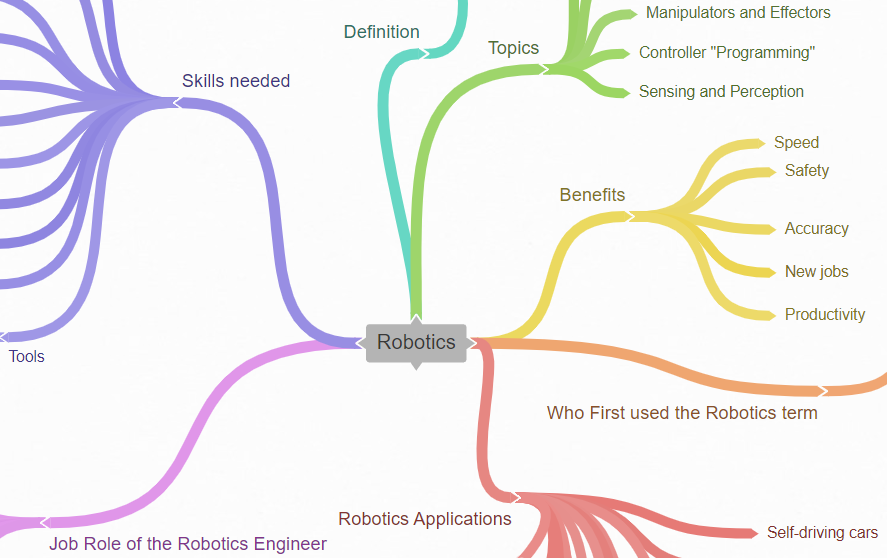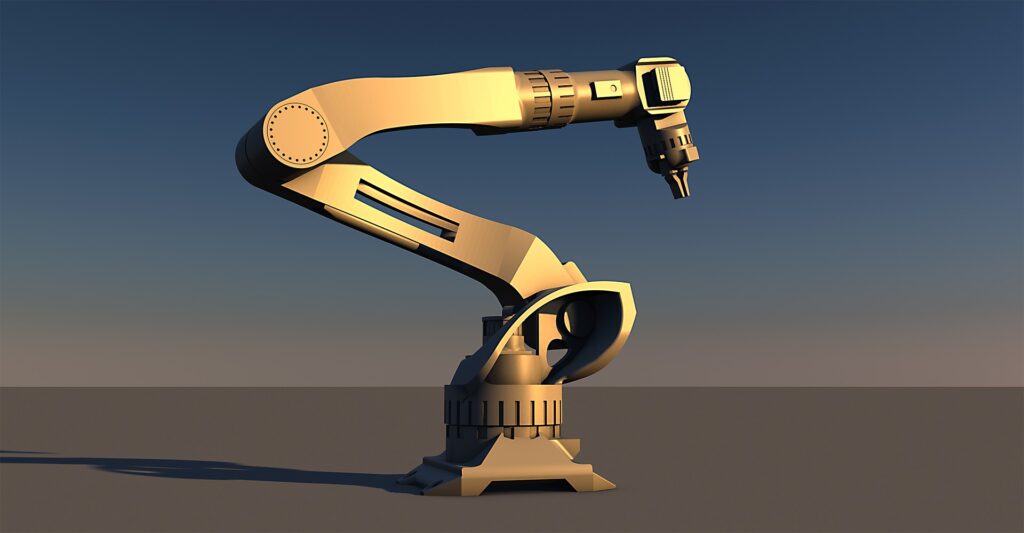In the name of Allah, most gracious and most merciful,

Table of Contents
1. Definition
It is a field concerned with the design, construction, and use of robots that could help and assist humans. They could replicate human actions so that they could substitute humans in some fields or domains. Some robots are operated by humans, while others are operated autonomously.
Robots are just the mechanical devices that do certain tasks. However by combining them with Artificial Intelligence we are making those robots smarter so instead of being programmed to do something if something happened, it could have some sort of intelligence that helps it in decision-making in different unanticipated situations. That is a sort of intelligence which is like the brain for humans.
2. Topics
2.1 Operator Interface
The medium of communication between the user and the robot. They should be easy to use and enable easy and effective communication between the user and the robot.
2.2 Mobility or Locomotion
It depends on the environment in which the robot will be used in. The robot might need wheels, or joints, or even propellers to navigate the environment. These are like arms for humans.
2.3 Manipulators and Effectors
Parts of the robot that allow it to pick something or manipulate an object like fingers for humans.
2.4 Controller “Programming”
It is the language needed for communication between the operator interface and the robot. In other words, it is like the brain of the robot.
These could be divided into three parts:
- Real-time commands given by humans.
- Programmed series of tasks that the robot should perform autonomously.
- Programs that adapt to the changing environment and could either be programmed by Machine Learning (i.e. from data), or by Reinforcement Learning (i.e. from experience, rewards, and trial & error).
2.5 Sensing and Perception
These are the devices that allow the robot to navigate through the environment. They are like eyes, and ears for humans. Therefore robots could see, listen, touch and act accordingly.
What you Expect to Learn in Details (Modern Robotics: Mechanics, Planning, and Control Table of Contents)
- Configuration Space
- Rigid-Body Motions
- Forward Kinematics
- Velocity Kinematics and Statics
- Inverse Kinematics
- Kinematics of Closed Chains
- Dynamics of Open Chains
- Trajectory Generation
- Motion Planning
- Robot Control
- Grasping and Manipulation
- Wheeled Mobile Robots
3. Benefits
- Speed: No need to take a break.
- Safety: It could perform dangerous things for humans and even navigate in dangerous environments that humans can’t withstand.
- Accuracy: The error is known and expected. No errors will be due to fatigue, long working hours, or family problems at home.
- New jobs: Since robots are doing manual repetitive and sometimes even intelligent work. New jobs are in demand like engineers and technicians who build and maintain these robots while other jobs will be removed which are the jobs that the robots do efficiently.
- Productivity: They do what they are programmed to do as long as the sensors are working properly, and power is being provided for them.
4. Who First used the Robotics term
The Czech playwright, novelist, and journalist “Karel Čapek (1880-1938)” has introduced it in his 1920 hit play, R.U.R. “Rossum’s Universal Robots”.
5. Robotics Applications
- Self-driving cars
- Factory assembly lines
- Security
- Autonomous Mobile Robots
- Humanoid Robots
- Space Exploration
- Educational Robots
- Generic Robot
- Food Preparation
- Agriculture
- Health Care
- Underwater Exploration
- Customer Service
6. The Job Role of the Robotics Engineer
- Design prototypes for building robots.
- Testing robots.
- Design the robotic system from start to end.
- Develop and maintain the software that controls the robot.
- Integration test.
- Apply machine learning techniques.
- Monitor robotic systems and optimize their functionalities.
7. Skills needed to work as a Robotics Engineer
Note that not all of these skills are necessary to start working as a Robotics engineer. Moreover these are general skills, and depending on the exact subfield of Robotics there could be other more specific skills that are not mentioned here.
- Mathematics: (Algebra, calculus, Geometry, etc…)
- Applied Physics, and Mechanics
- Electronics
- Systems Thinking
- Programming (Python, C++, etc…)
- Artificial Intelligence Basics
- Control
- Technical and IT knowledge: (operating systems, databases, etc…)
- Problem-Solving
- Cost, efficiency, and productivity optimization methods
- Tools: computer-aided design and drafting (CAD), Computer-aided manufacturing (CAM), Robotic process automation (RPA-related technologies) such as UiPath and BluePrism
Finally
Thank you. I hope this post has been beneficial to you. I would appreciate any comments if anyone needed more clarifications or if anyone has seen something wrong in what I have written in order to modify it, and I would also appreciate any possible enhancements or suggestions. We are humans, and mistakes are expected from us, but we could also minimize those mistakes by learning from them and by seeking to improve what we do and how we do it.
Allah bless our master Muhammad and his family.
References
https://en.wikipedia.org/wiki/Robotics
https://www.onlinerobotics.com/news-blog/understanding-5-primary-areas-robotics
https://www.youtube.com/watch?v=VYA17BrH9rU
https://www.bbntimes.com/technology/everything-you-need-to-know-about-robots
https://www.roboticstomorrow.com/story/2018/08/7-advantages-of-robots-in-the-workplace/12342/
https://www.sciencefriday.com/segments/the-origin-of-the-word-robot/
https://link.springer.com/chapter/10.1007/978-3-319-62533-1_1
https://www.geeksforgeeks.org/top-10-applications-of-robotics-in-2020/
https://www.careerexplorer.com/careers/robotics-engineer/
https://resources.workable.com/robotics-engineer-job-description
https://www.northeastern.edu/graduate/blog/robotics-skills/
https://robodk.com/blog/core-robotics-skills-needed/
https://www.amazon.com/Modern-Robotics-Mechanics-Planning-Control/dp/1107156300

